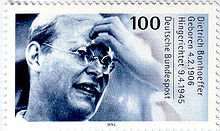Building Christian Community

Dietrich Bonhoeffer on the 1995 German commemorative stamp.
Image: Wikimedia Commons
Why do we need community? Simply put, because of Christ. He is in us, and we are one in him. This is a spiritual reality even if it is not apparent in the many expressions of Christianity. Those who truly believe are one. Again Bonheoffer speaks in this regard: “Christianity means community through Jesus Christ. … It means first that a Christian needs others because of Jesus Christ. It means, second, that a Christian comes to others only through Jesus Christ. It means, third, that in Jesus Christ we have been chosen from eternity, accepted in time, and united for eternity.”2
This little book has given us some good ideas, but it is not exhaustive. Still, we touched upon some quintessential aspects of community, for example, intercession. We intercede for the world in prayer, and we see great and wonderful things because our God is real and he answers. Networking and socializing is another. Jesus went to weddings. In the gospels we see him and his disciples at many social events. He was a high-profile figure as well as up close and personal, and we should be too. Home ministry is also important, making the church less an institution and more a communal “home.” In all of these, we open our hearts to the world around us, showing forth his love and healing power.
Then there is the sharing of our gifts. Real community does not limit its members to one or two people’s ways of doing things, but makes room for the infinite creativity with which the community is endowed. We minister to one another with the supernatural gifts of the Holy Spirit that are given to build us up and mature us. Everyone brings something to the table of fellowship. We trust each other in the Lord. We become intimate friends, listening to each other’s cares and encouraging each other in the faith. We meet frequently to enjoy each other’s fellowship, not just in a formal service where we only see the back of our brother or sister’s head. We recognize that Christ is our constant companion because we recognize him in each other. We do creative things together. We take care of each other. We protect each other. We encourage each other in godliness. We love and pray for each other and for our enemies. We have fun together. We help each other when we need help. And, as a result, others cannot help but be attracted to our gatherings because what we have is not found in a mere club or bar or even in a support group. This is abundant life, the life we live together with Christ.
Is your expression of church like this? If not, then you have some work to do. In the New Testament, you will find the expression “one another” referring to how the body of Christ should behave toward each other. There are over fifty such references. It is a word study worth doing to look for these statements of “one another” or the Greek word allelon in the New Testament. If you can start implementing those, then you will see wonderful changes in your fellowship. In addition, you can also begin to think outside of your boxes. God is not confined to them, you know.
Category: Ministry, Summer 2015


